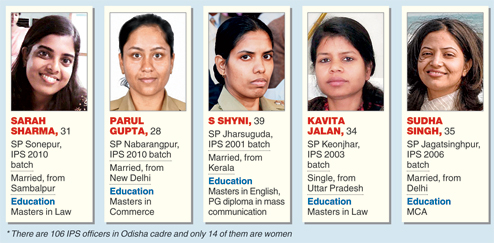 |
Five women IPS officers are in charge of five of the state’s 30 districts as police superintendents. This is the first time that Odisha has so many women superintendents of police (SP). Duty comes first for these officers, who stay far away from their families and are always ready for any assignment despite the occupational hazards and other challenges involved. But they feel there is a long way to go when it comes to basic infrastructure for women, especially policewomen in subordinate ranks
Everyday challenges
For Jharsuguda SP S. Shyni lack of toilets is a major worry. The problem, she says, was present in the past and continues to persist.
Echoing Shyni, her Sonepur counterpart Sarah Sharma says: “It is matter of a woman’s dignity. But separate toilets for women — be it for police officers, constables or even accused — is still a far cry at police stations.”
Keonjhar SP Kavita Jalan feels that the problem is considered trivial, but is actually big.
“These problems exist even at BDO offices and collectorate,” she said.
One of the officers says that she has to return to her quarter to attend nature’s call. The situation becomes particularly difficult during tours, she says.
Women at work
When it comes to evaluation of performance, gender discrimination bugs these officers.
Shyni said that in general, women officers needed to prove themselves every time to be rated as outstanding while there was no such pressure on their male counterparts.
“There is definitely more scrutiny for women in Indian police. Just like the society at large, the police also follows patriarchal values,” she said.
Nabarangpur police chief Parul Gupta echoed Shyni. She said women officers had to work doubly hard to prove that they were able to perform and big assignments were usually thought to be tough for them.
“I usually insist that I’m not given a peace posting. And sometimes, officers who have joined work after giving birth are, out of care, not given field assignments and this is not fair,” she said.
“In a way, sometimes it is believed that women officers are not as capable,” said Kavita.
These officers, however, are ready to deal with any situation. To them, Naxalism and crime against women need utmost attention.
“There are many pressures at work. Rise in crime against women and Naxalism are major concern for any SP,” Sarah said.
Crime against women
The spirit to make the state safe for women dominates the thoughts of these officers.
Sarah is categorical when it comes to women issues. “We are good at counselling and convincing victims to speak up is easier for us since we understand and genuinely empathise with them,” she said.
Parul feels the sensibility of women officers to gender crimes is different. “Yes, there are good male officers who pursue these cases very hard, but the victims feel comfortable with us,” she said.
All the officers agreed that crime against women had increased, but they added that the visibility was more because cases were now being reported.
“Women have more faith in the system and victims approach us,” Kavita said.
Reservation in police
The Centre has advised states to follow the Gujarat policy of providing 33 per cent reservation to women in police. Last year, the Naveen Patnaik government announced 50 per cent reservation for women in civic bodies. This makes the officers hopeful of the government emulating the Gujarat model.
“There should be more women in the force since they bring patience, kindness and tolerance to the table and helps change the image of the police,” said Kavita.
Similarly, Shyni wants to see more policewomen at every station. “It obviously makes women victims comfortable. The profession also gains from their sincerity and integrity since women are always eager to prove themselves,” she said.
Family and work
Balancing home and work is one challenge that these women officers have to battle everyday.
“I’m lucky my husband is with me right now but that it is not the case always. Women officers definitely need more understanding life partners and there are always compromises from both sides,” said Shyni.
Parul, who loves her job for its excitement and challenges, says living far from family is part of the job.
“Today, staying away from family is a common for both men and women. But there are many who still think family members should relocate to where the male member has moved. Also, if the family is together, a woman, no matter who she is, is expected to come home and look after the family. This is not the case with men,” said Parul.
Kavita feels lucky to be single till now, but she often has to stay away from her parents.
Almost echoing Parul, Jharsuguda SP Shyni said: “No matter how much things change at work, there is still not enough gender equality at home. I know many women officers who supervise their domestic responsibilities, too, after returning from duty.”
Sarah agrees that balancing both family and work is a real challenging for them.
Odisha experience
While Shyni hails from Kerala, Kavita is from Uttar Pradesh. Jagatsinghpur SP Sudha Singh and Parul are from Delhi, while Sarah Sharma is from Sambalpur. Coming to Odisha from outside should have been tough, but to these officers the state and its people have been warm and appreciative. “There is a lot of respect for women officers in Odisha,” said Sarah.
Shyni, too, feels both colleagues and the people have been pretty fair to her.
“As compared to other states, people here accept women officials in high ranks as well as subordinate officers,” she said.
Parul, like the other women SPs, feels it was easy to adapt to the lifestyle, language and food of the state.
“As such, we adapt very quickly at our level. But it has been a wonderful experience here,” she said.

